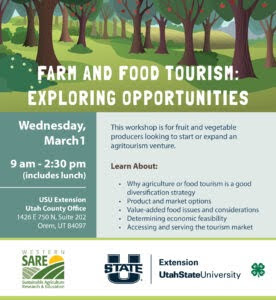Final report for WUT21-001
Project Information
The 2021-24 Utah Western SARE Professional Development Program (PDP), also known as the State Implementation Program (SIP) provided resources and training to agricultural professionals and producers that promoted the goals of Western SARE. The program was guided by an Advisory Committee of six members. The Committee urged the Utah WSARE SIP to seek answers to the state’s challenges, such as being the 9th most densely urban and the 2nd most arid state in the nation, in a way that protects natural resources and human safety, and enhances the quality of life for our producers. Specific topics recommended by the committee for 2021-24 included improving local production and distribution of food, building soil health practices, increasing adoption of integrated pest management (IPM), and improving sustainable grazing.
Three objectives targeted the overall goals for the Utah WSARE SIP in 2021-24 to increase local production and distribution of food, build soil health practices, increase adoption of integrated pest management (IPM), and improve sustainable grazing.
- Increase knowledge and skills of nine Utah Extension agricultural professionals and up to 300 producers through the award of approximately three mini-grants each year for travel or event-hosting (offered spring and fall of each year), measured by reporting and follow-up surveys of award recipients. (“Travel/Event Hosting Awards”)
- Facilitate adoption of sustainable agricultural practices of 900 professionals and producers through the support of four conferences and workshops offered in spring, summer, and fall of each year, as measured by retrospective surveys after each event. (“Support of Conferences/Workshops”)
- Increase knowledge and skills of up to 120 agricultural professionals and 500 producers in integrated pest management through on-going presentations and delivery of publications and guides, conducted throughout the duration of the award, and measured by paper or online surveys. (“General Outreach”)
Because Utah is the 9th most densely urban, and the 2nd driest state in the nation, the Utah WSARE State Implementation Program (SIP) Advisory Committee recognized that this program must address these challenges to protect natural resources and human safety while enhancing the quality of life for our producers, particularly within specialty crops (13,600 acres valued at $33 million) and forage and rangelands (710,000 acres). Training efforts and travel awards were based on past crop surveys (conducted by our partner, the Utah IPM Program), past conference pre- and post-surveys, and input from the SIP Advisory Committee.
The Utah WSARE SIP primarily reaches the livestock, forage, and specialty crop industries, particularly on small farms. For 2021-24, the program directed resources to the following activities each year: conferences/workshops, training in IPM, access to publications, and mini-grant awards. Delivery of resources was a mix of virtual and in-person. Two of the conferences are long-standing events that have been supported by the Utah WSARE SIP in the past, and as needed, the SIP supported additional workshops pertinent to the objectives. Mini-grant awards for professional travel, event hosting, and small research projects were also important components of this program.
Advisors
Education
The Utah PDP emphasizes multiple modes of education, including face-to-face, written and online, and self-exploratory. The content for the workshops and conferences range from beginner to intermediate and consist of indoor presentations and where appropriate, hands-on activities or outdoor farm visits. The trainings also include complementary written materials and publications for attendees to review. The written and online training involves production and delivery of crop management guides and a subscription email service of seasonal, pertinent content. The self-exploratory education occurs through travel and event hosting scholarships, where agricultural producers attend or host professional development workshops to further their understanding of sustainable agriculture, and pass the information on to their constituents.
Education & Outreach Initiatives
Increase knowledge and skills of nine Utah Extension agricultural professionals and up to 300 producers through the award of approximately three mini-grants each year for travel, event-hosting, or projects (offered spring and fall of each year), measured by reporting and follow-up surveys of award recipients.
In 2021, The Utah WSARE PDP has so far awarded one event-hosting scholarship and one project award. The event-hosting award was given to the Utah Association of Conservation Districts to host a workshop called Soil Health for Beginners. This workshop, held on Feb 15, 2022, was part of the overall 3-day event, 2022 Utah Soil Health Conference in St. George Utah. The workshop consisted of three presentations and a field component that included a soil health assessment and soil health demonstrations. The Utah PDP sponsored the supplies needed for the field component (books, brix meters, pliers, etc.).
The project award is to develop a small demonstration vegetable garden and test biological fungicides against cucurbit powdery mildew as well as a squash trap crop trial against squash bug. This project will begin in spring 2022.
In 2022, the Utah WSARE PDP awarded two mini-grants: one event-hosting scholarship and one project award. The event-hosting award was again given to the Utah Association of Conservation Districts to host the second annual Soil Health in the West workshop for beginner farmers. This workshop, held in Feb 2022, was part of the overall 3-day event, 2022 Utah Soil Health Conference in St. George, Utah. The workshop consisted of in-class sessions on soil health, a No-Till Drill demonstration, and a field visit that provided soil health demonstrations and a hands-on field assessment. The Utah PDP sponsored the supplies needed for the field component (Soil Owner’s Manual and other books, moisture sensors, brix meters, pliers, etc.).
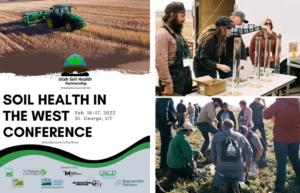
The mini-grant project award set up an integrated pest management (IPM) vegetable demonstration farm. The farm is a full acre of fourteen, 200-foot rows of crops. Various demonstrations in 2022 included an organic fungicide trial for cucurbit powdery mildew (squash, cucumber, and watermelon), weed management options, squash trap cropping (Hubbard squash) against squash bug, colored mulches to prevent virus diseases on tomato, row covers for insect exclusion, insect trapping options, and flower “insectary” strips to attract beneficial insects.
In 2023, the Utah WSARE PDP awarded two event-hosting scholarships, one new project award, and one project continuation award. The event-hosting awards were given to two USU extension agents to host a High School Range Camp and Teacher’s Range Camp. The High School Range Camp had 27 participants, and was a partnership between the Utah Society for Range Management and USU Extension that provided opportunities for leadership, education, professional networking, and hands-on learning. Topics and activities spanned 5 days and included plant collecting and pressing, soil 101, field ecology, wildlife interactions, rangeland restoration, tours of restoration research, wild horse management, shrub encroachment, and sage grouse restoration. Students learned proper note-taking, took quizzes, and each presented on a topic of their choice.
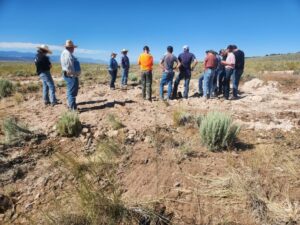
The 3-day Teacher Range Camp was developed to help high school agriculture teachers learn more about range management and to help them develop curriculum for their classes. Topics given to the 30 attendees included rangeland restoration, plant identification and collection, soils, ecology, and grazing management.
The new project award was to establish an Urban Youth Livestock program at the USU Bastian Agricultural Center with the goal of providing a unique opportunity for inner-city youth to raise livestock as part of a 4-H or FFA program that would otherwise not have an opportunity. The program purchased animals for the 40 youth participants, and provided club meetings to educate youth on how to properly feed, care for, groom, train, and prepare their animals for show. The ultimate goal was to raise the animals to a marketable weight and to participate in the Salt Lake County Junior Livestock Show.
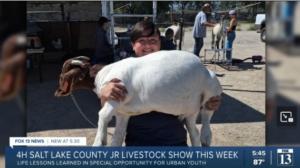
The continuing project award was to monitor soil moisture at the previously-established integrated pest management vegetable demonstration farm. In 2023, 12, 150-foot rows of various vegetable crops were planted. IPM demonstrations included soil moisture monitoring, intercropping for onion thrips, weed management options (wheel hoeing, plastic mulch, fabric mulch, and straw), fine-mesh insect exclusion netting, in-ground bait traps for earwigs and cutworms, colored mulches for virus suppression, and pollinator and beneficial habitats. Results were posted 32 times to our Instagram and Facebook pages, and 6 videos were created on the farm itself, using straw mulch, using plastic mulch, leaf-feeding beetles, cabbage looper management, and grasshopper control. In August 2023, the program hosted on-site tour of the demonstration farm in which 34 individuals attended.
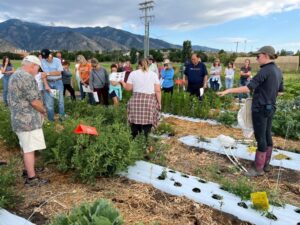
In 2024, the Utah Western SARE State Implementation Program (SIP) awarded seven travel awards, one event-hosting award, and two project awards. The awards were granted to USU Extension agents that demonstrated they would be presenting at the event and showed that they would incorporate what they learned in training their own clientele. The awards were to attend the following: annual National Association of County Agriculture Agents (2), Society for Range Management Annual Conference, 31st Vertebrate Pest Conference (3), and the Rural Sociological Society Annual Conference.
The event-hosting award was given to host the second annual Teacher’s Range Camp. The 3-day Camp was developed in 2023 to help high school agriculture teachers in Utah learn more about range management and develop curriculum for their own classes. Topics taught to the 38 attendees in 2024 included rangeland management, plant identification, soils, ecological site descriptions, and grazing management in both classroom instruction and hands-on fieldwork.
The two project awards were to test the use of organic herbicides for conservation areas and establish a demonstration apple orchard. The herbicide project tested three alternative herbicides (Captain Jack's Dead Weed Brew, Weed Pharm, and FireHawk Bioherbicide), one negative control, and one synthetic herbicide (Weed Master), on noxious weeds (musk thistle, Canada thistle, and garlic mustard). For the orchard project, tree availability was delayed to winter 2025. Trees will be planted in spring 2025 with micro-sprinkler irrigation, and the orchard will be used as a teaching and demonstration site for managing apple pests.
In 2021, At the beginner soil health workshop, there were 42 producers and 7 ag professionals in attendance (from NRCS, Utah Dept of Agriculture and Food and Conservation Districts). A survey was delivered to attendees and 95% of producers improved their understanding of soil health and 38% of them felt that they could incorporate this new knowledge into their current farm practices.
In 2022, At the beginner soil health workshop (event-hosting award), there were 68 producers and 11 ag professionals in attendance (from NRCS, Utah Dept of Agriculture and Food and Conservation Districts). A survey was delivered to attendees and 91% of producers improved their understanding of soil health and 40% of them felt that they could incorporate this new knowledge into their current farm practices.
The vegetable IPM demonstration farm (project award) was successfully established and attracted the attention of the Utah Department of Agriculture and Food who provided flowering perennials as a border planting for pollinator monitoring. Three field days were held at the farm, attracting an average of 35 producers at each. The exit survey revealed that 99% of attendees were satisfied with the event, and 92% learned something new. The project also wrote two articles. Utah Pests News (page 3), "New Vegetable IPM Farm is an Outdoor Classroom," was distributed via email to over 11,000 subscribers and USU Outcomes & Impacts Quarterly (page 3), "Demonstration Farm Provides Educational Opportunities for Integrated Pest Management," is a peer-reviewed journal distributed to professionals in cooperative extension nationwide.
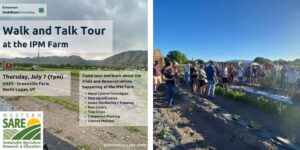
In 2023, For the High School Range Camp, students were surveyed about their knowledge before and after the camp. We found that there was an 80% increase in knowledge of noxious weed management, a 655% increase in overall knowledge of rangeland management, and a 92% increase in plant identification. A longer-term outcome is that 50% of attendees decided to pursue a degree in natural resource management as a result of their camp experience.
For the Teacher Camp, 100% of attendees improved their knowledge on all topics, with the greatest improvement being a 65% improvement in ecological science. Most teachers intended to pass on the information, where 85% will incorporate information into their own classes, 35% will mentor other teachers, 95% will encourage students to attend a range camp, and 22% will host their own workshops for students.
The Urban Youth Livestock program was very successful. It gained the attention of Fox News, and the FFA Chapters recognized the special significance of the program. Participants were asked whether the program affected their life skills, with much improvements. All attendees learned about responsibility, leadership skills, working in a team, communication skills, and goal-setting, while 75% learned about the importance of a strong work ethic, 75% learned about livestock as a career, and 85% learned the importance of animals in society. The program will continue with other funding, and returning youth will be able to mentor a new set of participants.
For the IPM vegetable farm, participants of the tour were highly satisfied, where 63% improved their knowledge of identifying insect pests and beneficials, 52% intend to incorporate row covers at their own sites, 53% intend to use trap cropping or companion planting, and 89% learned that weed management is important with vegetable production. Additionally, an undergraduate student that attended the tour was so inspired that they volunteered to help in farm management and with two of the videos. And finally, a peer-reviewed paper was published in Outcomes & Impacts Quarterly, “Surveying and Evaluating Pests and Beneficial Insects in Utah's Vegetable Production”.
In 2024, Each travel awardee submitted a report of their presentation, knowledge gained, and plans to share new knowledge. Increased knowledge of the awardees included alternate energy sources for farms, grant-writing, recruiting students for ag camps, wild horse management, invasive vertebrate pests in farms (hogs), and appropriate survey methods for nutrient management adoption. All awardees noted plans to share new knowledge with farmers (including influential farmers), grade-school kids, conservation district boards, and with peers at workshops, meetings, one-on-one and in-service trainings.
The Utah Ag Teacher Camp is in its second year, and it has already received attention from the Bureau of Land Management, Working Lands Conservation, and Diné College of the Navajo Nation, which sent eight college students and two high school teachers to attend. Attendees responded in an evaluation survey that 95% plan to incorporate all subjects into their school curricula (85% in 2023) and 100% of attendees improved their knowledge on all topics. Based on the teacher’s school and student count, it is estimated that 6,300 students are impacted annually by the teachers who attended range camp
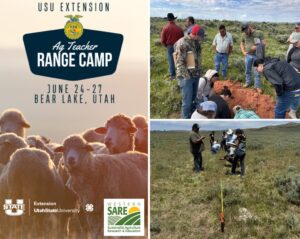
Utah Ag Teacher Range Camp advertisement (left) and teachers participating in hands-on measurement activities (right).
The herbicide project found that the alternative herbicides significantly reduced musk thistle and garlic mustard, but not Canada thistle. These results show promise in using non-persistent herbicides in conservation areas. The project team held a field day to 22 attendees and is currently developing a fact sheet.
Facilitate adoption of sustainable agricultural practices of 900 professionals and producers through the support of four conferences and workshops offered in spring, summer, and fall of each year, as measured by retrospective surveys after each event.
In 2021, The Utah PDP Coordinator served on the planning committee for the annual Utah Urban and Small Farms Conference (held virtually, February 22-25, 2022), which was attended by 336 agricultural professionals and producers. At this conference, the PDP Coordinator helped organize and taught at a half-day berry production track. As companion events, we also held in-person field days in three locations in March, attended by an average of 26 ag producers each.
The PDP sponsored the conference proceedings (which included one page dedicated to Western SARE) for the 44th Annual UT/AZ Range Livestock Workshop and Tour, to be held in late March 2022 with current registration at 28 ag professionals and 210 producers.
In 2022, The UT/AZ Annual Range and Livestock Workshop is an event that the WSARE PDP program has been involved with for many years. It brings together ranchers, land management agency personnel, representatives from federal and state agencies, state farm bureaus, conservation districts, and businesses serving the livestock industry. In 2022, the Utah WSARE PDP sponsored the conference proceedings (which included one page dedicated to Western SARE) for the 44th annual workshop and tour, held in late March 2022. Topics included rotational grazing, virtual fencing, livestock handling, prescribed burning, grazing on public lands, trail and game cameras, and funding opportunities (including through Western SARE).
The Sustainable Grazing Institute is a workshop for Utah livestock producers who want to increase sustainable forage production, animal performance, and net income through improved grazing management. The 4th annual workshop was held over three days in early June 2022. Participants learned the science of grazing in a classroom setting and made management decisions in the field, designing pastures for grazing livestock. Topics included [upload agenda] estimating potential forage yields, management of temporary fencing and grazing cell design, pasture forages, pasture irrigation and fertility, and forage pest management.
In 2023, The UT/AZ Annual Range and Livestock Workshop is an event that the WSARE PDP program has been involved with for many years. It brings together ranchers, land management agency personnel, representatives from federal and state agencies, state farm bureaus, conservation districts, and businesses serving the livestock industry. In 2023, the Utah WSARE PDP sponsored the conference proceedings (which included one page dedicated to Western SARE) for the 45th annual workshop and tour, held in southern Utah in March. Topics included range analysis, estate planning, drought and fire planning, partnering with public agencies, trichomaniasis, beef quality assurance and certification, and funding opportunities (including through Western SARE).
The Sustainable Grazing Institute is a workshop for Utah livestock producers who want to increase sustainable forage production, animal performance, and net income through improved grazing management. The 5th annual workshop was held in June 2023 as a 3-day hands-on workshop where participants learned the science of grazing in the classroom and made management decisions designing pastures for grazing livestock. Topics included grass growth, designing grazing cells, economics of grazing, and sustainable grazing methods.
In 2024, The Utah Western SARE SIP program has supported the Utah High School Range Camp for the past three years and now provides ongoing support. Through a balance of outdoor activities, hikes, and classroom study, the Range Camp offers students a background in ecological principles, provides the tools to measure rangeland health, and offers an understanding of the resource management process. The camp also discusses the roles of humans in natural resources with special attention given to conflict resolution. The 2024 camp had 23 participants. Topics and activities spanned 5 days and included plant collecting and pressing, soil 101, forage estimation, wildlife interactions, ecosystem health, stocking rates, wild horse management, and shrub encroachment. Students learned proper note-taking, took quizzes, and each presented on a topic of their choice.
The Sustainable Grazing Institute is a workshop for Utah livestock producers who want to increase sustainable forage production, animal performance, and net income through improved grazing management. The 6th annual workshop was held in June 2024 as a 2-day, hands-on workshop where 48 farmers and 7 ag professionals learned the science of grazing in the classroom and made management decisions designing pastures for grazing livestock. Topics included grass growth, designing grazing cells, economics of grazing, and sustainable grazing methods.
In 2021, At the Urban and Small Farms Conference and companion in-person field days, the Western SARE PDP taught and spoke with approximately 16 ag professionals in NRCS, Utah Dept. of Agriculture and Food, USU Extension, and non-profits, and 82 producers. In a 4-question Zoom poll that was delivered to attendees in the berry production track, 92% of producers increased their knowledge of sustainable berry production, 94% increased their knowledge of berry insects and diseases, 53% would incorporate at least one thing they learned into their own practices, and 78% of ag professionals felt that they could incorporate new knowledge learned into their own training programs.
An evaluation survey will be distributed to attendees of the Range Livestock Workshop. In the past, the learning has been significant in many topic areas including watershed restoration, cattle nutritional management and profitable ranch management.
In 2022, The range and livestock workshop was attended by 164 (45% farmers and processors, and 55% professionals), representing approximately 2,100 managed cattle. Overall, 95% of attendees increased their knowledge, 82% modified their opinions, and 64% will share their new information with others and they scored the workshop a 4.4 out of 5. When asked about their knowledge level of each individual topic before and after the workshop, the percent change ranged from 26% to 20% and averaged 52%.
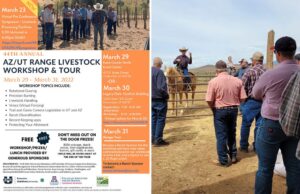
The Sustainable Grazing Institute was attended by 30 livestock producers and 7 agricultural professionals representing almost 4,000 acres and 947 grazing animals. In a follow-up survey, 95% of attendees felt the event was “”very good” or “excellent”. When averaging attendees’ responses for each individual topic, 45% reported that their knowledge level was “much improved,” and 81% of attendees intend to adopt new skills. In addition, 60% “strongly agree” that their new skills will improve their farm's profitability, and 30% “strongly agree” they will be successful in implementing the new practices on their farm.
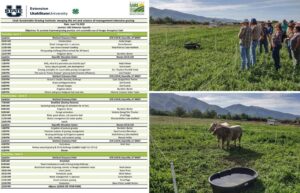
In 2023, At the range and livestock workshop, 211 Utah producers and 60 Utah agricultural professionals were in attendance representing approximately 4,400 managed cattle. On average, the quality of the workshop was scored as “excellent” and producers reported, on average, a 45% increase in knowledge of all topics. In addition, 69% of producers intend to adopt at least one new practice and 54% of ag professionals say their advice to their clientele will improve.
The Sustainable Grazing Institute was attended by 32 livestock producers and 8 agricultural professionals. In a follow-up survey, participants’ responses included: 79% gained new skills and 77% will apply something new to their farm or ranch.
In 2024, For the High School Range Camp, students were surveyed about their knowledge before and after the camp. Overall, 100% of students increased their knowledge of rangeland management and noxious weed management. A longer-term outcome is that 53% of attendees plan to pursue a degree in natural resource management as a result of their camp experience. And finally, several campers (4) were repeat attendees desiring to learn more.
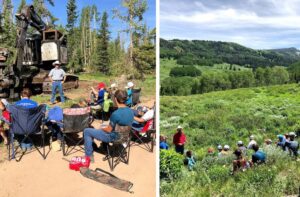
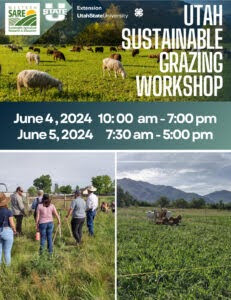
Attendance for the Sustainable Grazing Institute increased by 50% from 2023. In a follow-up survey, participants’ responses included: 82% gained new skills and 71% will apply something new to their farm or ranch.
Increase knowledge and skills of up to 120 agricultural professionals and 500 producers in integrated pest management through on-going presentations and delivery of publications and guides, conducted throughout the duration of the award, and measured by paper or online surveys.
In 2021, The Utah PDP Coordinator organized a 2-day advanced integrated pest management workshop in September 2021 for ag professionals, held in Park City, UT. The first day was discussion of new IPM technologies not yet adopted by producers and methods to promote adoption. The second day was a tour of farms and natural areas, with further discussion. In-person attendance included 14 ag professionals and online attendance (for the first day only) included an additional 13.
The Coordinator promoted SARE publications and Western SARE grant opportunities at four fruit grower meetings in June-July 2021 and March 2022 (35 producers and 3 professionals) and three Extension presentations, reaching 54 hemp producers, 28 vegetable producers, and approximately 18 agricultural professionals.
In 2022, The Utah PDP Coordinator promoted SARE publications and Western SARE grant opportunities at three fruit and vegetable grower meetings (82 producers and 13 ag professionals), at workshops listed above, and at the Annual Utah Fruit Convention in Jan 2022, Urban and Small Farms Conference in Feb 2022, and the Utah Invasive Species Workshop in Sept 2022 (total attendance for all three, 279 producers and 27 professionals). In addition, the PDP Coordinator mentioned Western SARE at two webinars (soilborne pathogens and vegetable IPM), attended by 262 producers and 19 ag professionals.
In 2023, We held two sustainable agriculture events. A workshop for refugee farmers in collaboration with the International Rescue Committee was held in Salt Lake City in late spring 2023. An agritourism workshop was held in March, and each attendee received a packet of how-to materials and learned about diversification, product and service options, producing and marketing value-added foods, accessing and serving tourists, and economic feasibility.
In 2024, Nothing to report on this objective for this final year, as all 2024 expenses were devoted to existing conferences and mini-grants.
In 2021, As a result of the IPM workshop, 100% of the ag professionals in attendance became aware of new IPM technologies/practices (apps, UAVs, biocontrol methods, new trap cropping) to teach to their own constituents.
In 2022, At the webinars, attendees are provided a link to a survey where they enter responses to two simple questions. For the two 2022 webinars, 94% reported having increased their knowledge, and 79% reported that they planned to implement one new practice on their farm or operation.
In 2023, The refugee farmer workshop was attended by 20 farmers representing five different languages (with a translator for each). Topics were kept very simple, from composting to recognizing insect damage and safe use of pesticides. Evaluations were difficult due to the language barriers, but attendees asked many questions (through translators) and requested a workshop for 2024.
The 1-day agritourism workshop was held in Orem, UT and attended by 34 farmers, who mostly (94%) felt the workshop was helpful. In a follow-up survey sent 4 months later, 38% of farmers noted that they had incorporated an idea from the workshop into their business, and 16% felt that this had improved their profits.
In 2024, Nothing to report on this objective for this final year, as all 2024 expenses were devoted to existing conferences and mini-grants.
Educational & Outreach Activities
Participation summary:
Learning Outcomes
Project Outcomes
Face of SARE
In 2021, For promotion of Western SARE grants and services, the State Coordinator has so far reached approximately 135 agricultural professionals and producers through three presentations and four grower meetings in 2021-22. The audiences included producers of tree fruits, hemp, and vegetables. The coordinator has also promoted WSARE grants in emails to community mailing lists, the Utah Pests Facebook page, and through a quarterly newsletter delivered to over 11,600 individuals in Utah.
In 2022, For promotion of Western SARE grants and services, the State Coordinator has reached 154 agricultural professionals and 556 producers through a variety of events in 2022. The audiences included producers and professionals specializing in growing tree fruits, vegetables, and forage crops, and managing livestock. The coordinator has also promoted WSARE grants in emails to community mailing lists, the Utah Pests Facebook page, and through a quarterly newsletter delivered to over 11,600 individuals in Utah.
In 2023, For promotion of Western SARE grants and services, the State Coordinator has so far reached approximately 120 agricultural professionals and producers through two workshops, 1 grower meeting, and 1 farm field day in 2023. The audiences included producers of tree fruits, vegetables, and nursery stock. The coordinator has also promoted WSARE grants in emails to community mailing lists, the Utah Pests Facebook page, and through a quarterly newsletter delivered to over 15,300 individuals in Utah.
In 2024, Over the duration of this project, the State Coordinator promoted Western SARE grants and programs to an average of 61 agricultural professionals and 225 producers through many events including two workshops, five grower meetings, three presentations, one farm field day, and numerous emails and one-on-one consultations. The producer audience included both specialty and agronomic crop growers. The coordinator also promoted WSARE on the Utah Plant Health Facebook and Instagram pages (combined 3,785 followers), and in two articles included in a quarterly newsletter delivered to over 15,500 individuals in Utah.
